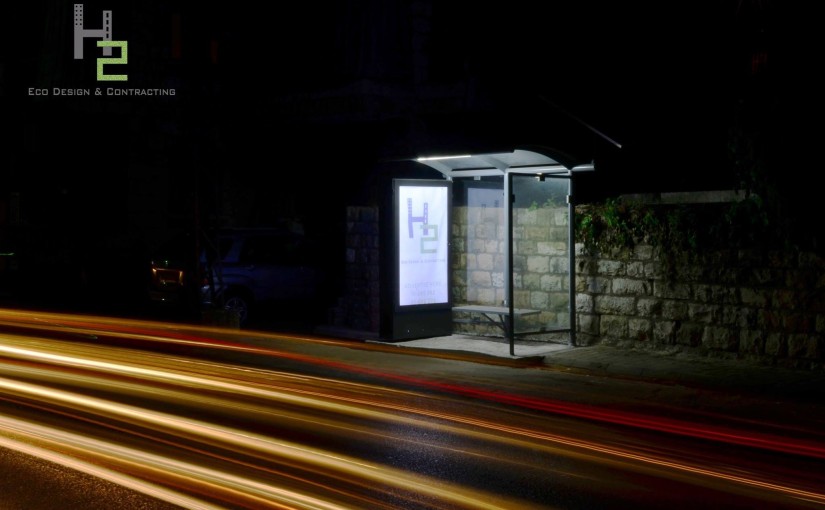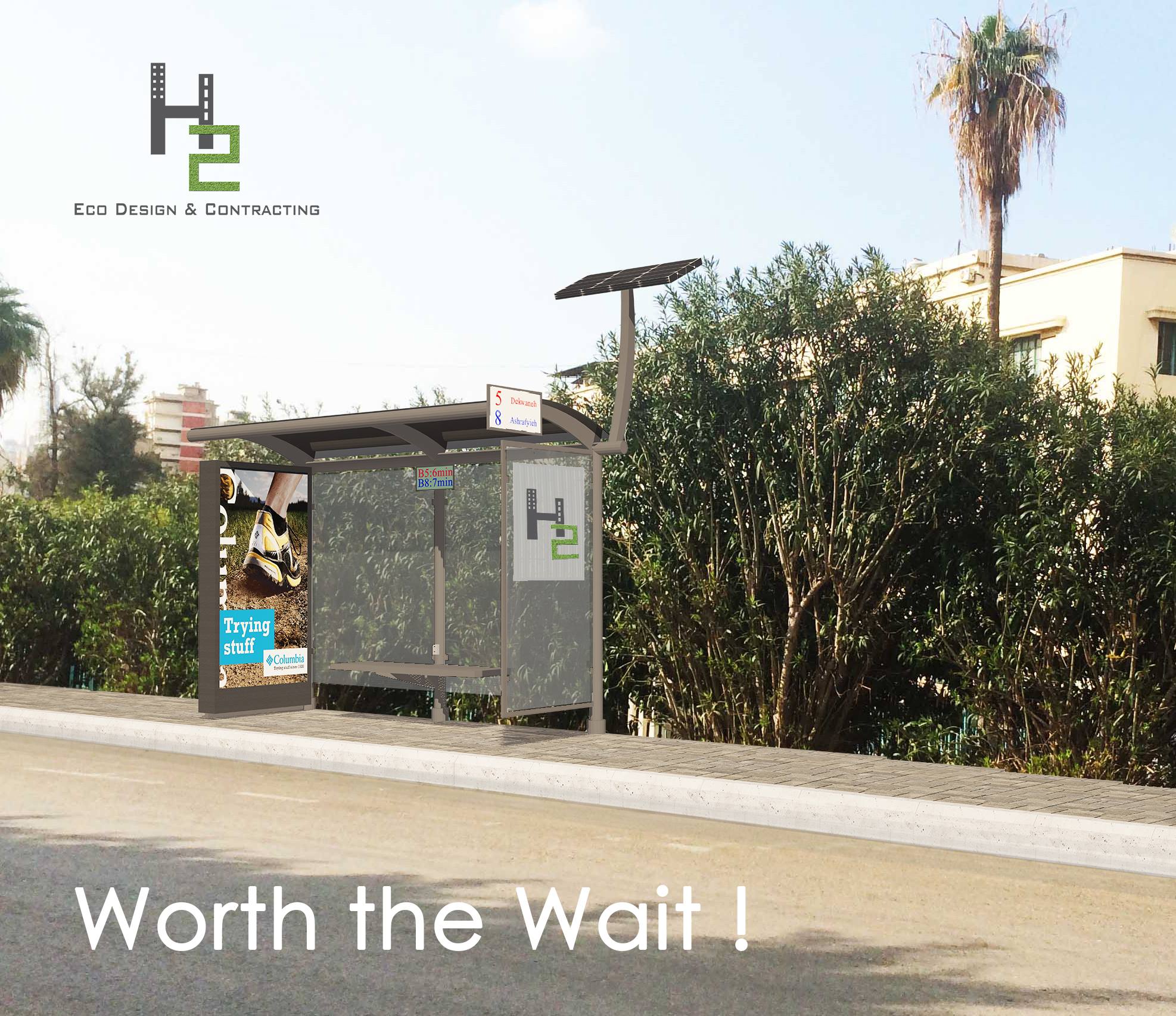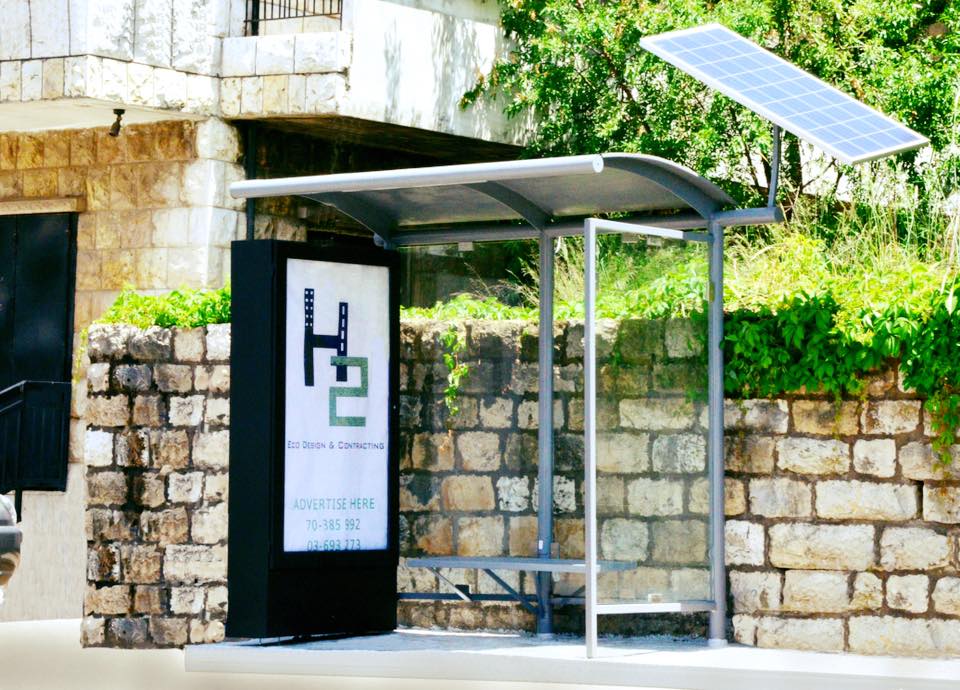by Mira Tfaily and Jad Baaklini
The earliest roots of what became Bus Map Project began as a search for grassroots, incremental approaches to public transport improvement in Lebanon. Over the last three months, we have been following and working closely with an eco-business and civil society initiative led by H2 Eco Design, a design and consulting firm working on implementing sustainable bus stops all over Lebanon. Their analysis and outlook very much fits into that bottom-up approach we have been eager to promote and contribute towards developing since day one.
Picture this scene: brand new bus shelters powered by solar energy that provide users with sockets to charge their phones — what cities or countries pop in your mind?
You may be surprised to know that we are talking about a Lebanese scenario. So far, the bright, young team of H2 Eco Design have installed four such bus stops in the Mount Lebanon municipality of Beit Mery.
Launched in May 2016 by Rodrigue Haibi, Ralph El Hajj and Charbel Hajj, H2’s Smart Bus Stops initiative aims at slowly nudging the informal transit system into a more organized and legible network of interconnected infrastructures. “While some bus stops actually exist in Lebanon, they are implemented by municipalities without any consistency. H2 works on ensuring a consistency to better regulate the informal system of stops,” explains Charbel Hajj.
The team was inspired by the way that public transport promotes social mixity in Europe, and started looking for strategies to encourage Lebanese people who dismiss these modes of transport to shift their perceptions and learn to use them locally. H2 Eco Design’s theory of change is bottom-up: “We can’t force drivers to stop at our stops, so we study the field in the most detailed way possible, so that drivers feel it’s organic and natural to stop there. Sometimes we work on an informal bus stop where all riders tend to wait and we displace it just a few meters to ensure better road safety and protection norms,” Charbel continues, showing how a perspective that takes the existing system seriously is generative for advocates of improvements in the transport sector.
“Our first obstacle was the blurred line between public and private… It was a bit of a mess,” he smiles. Yet, by allowing the existing system to speak for itself, the team was able to learn and adapt for a greater chance of project success.
This pragmatic and flexible approach is also seen in H2’s funding model. While one bus stop unit costs between $3500 and $4000, the team is able to finance the project through a tiered scheme that brings in both local business advertisements and investments from the municipalities they partner with.
“The reactions of the municipalities are really diverse: some are reluctant about our project, and reject and dismiss the existing bus system all together; others are extremely enthusiastic and responsive.” From this perspective, H2’s initiative is also an advocacy project, and a civic service that citizens are offering the state, filling the gaps in a concrete and practical way.
Beyond the obvious convenience of having marked stops all over the bus network, H2 Eco Design’s Smart Bus Stops catalyze broader benefits for the Lebanese transit system:
– Organizing public transport through consistency and formalization
– Stirring up interest of sustainability stakeholders regarding transit
– Mainstreaming the use of solar energy
– Attracting younger users (15 – 30 years old) through modern conveniences like USB charger sockets, because they are the future generation that will shape the country through their aspirations
– Contributing to road safety by encouraging more predictable bus starts and stops
– Advocating for people to understand and use public transport more: if they wait at the stop to charge their phones, half the work is done.
In parallel to their eco-business and the indirect lobbying they do when negotiating with municipalities, the H2 team has been intentionally developing the advocacy dimension of their work by holding talks in universities to discuss the stigmas attached to the Lebanese bus system.
Within the next two years, the team’s short-term goal is to help bus drivers get used to the stops, as well as encourage riders to use the buses through a combination of increased advocacy and more unit installations. With a projected rise in demand, it is hoped that bus drivers will start to organically adhere to these pick-up points, where the riders would be waiting. H2’s longer-term goal is to have about 10 to 15 bus stops per municipality, spaced by a maximum of 250 meters, in order to achieve a seamless public transport experience across the country through adaptation and coordination.
This collaborative spirit is very much the heart of the initiative; when a bus stop or shelter of some kind already exists in a municipality, H2 Eco Design works on renovating it, and not replacing it from scratch.
This does not mean that the team denies the usefulness of some top-down policies: “Ideally, we are pushing for a legislative step towards a fine for drivers who stop in the middle of the road; a little bit like what happened with traffic lights. At the beginning, people saw them as decorative lights, but when the law with a fine was implemented, 60% of people started to stop, and now we’re up to 98%. We’re aiming towards a gradual change,” concludes Charbel.
Just like the Bus Map Project, H2’s approach is rooted in small-scale, appreciative measures; working with the system to better the system — joud bel mawjoud.


